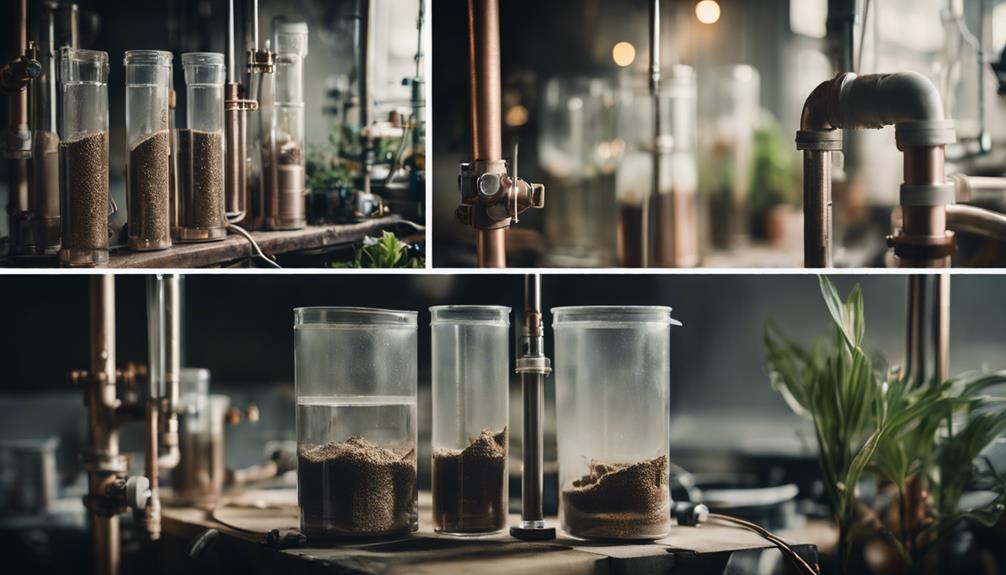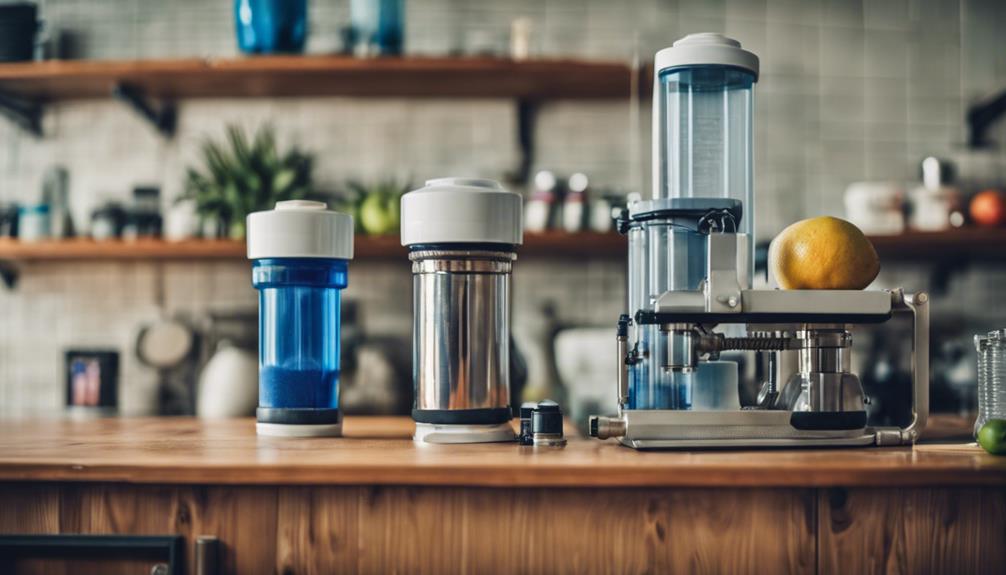You're likely to be disappointed with commercial air and water filter systems, which often fall short on their performance promises, are expensive to maintain, and neglect to address significant contaminants like gases, odors, and VOCs. In contrast, DIY filter systems offer customization to meet your specific needs, addressing unique air quality concerns and providing a cost-effective solution. By designing a system that fits your room size and layout, you can achieve better performance and filtration efficiency. With the freedom to upgrade or replace individual components, you'll find that DIY systems can outperform commercial air cleaners. Now, explore how to create a tailored solution that puts your health and well-being first.
Table of Contents
Key Takeaways
- DIY filter systems offer customization to meet specific needs and preferences, addressing unique air quality concerns more effectively than commercial options.
- Customizable DIY filters can outperform commercial air cleaners in terms of filtration efficiency and effectiveness, providing better air quality.
- DIY filters are a cost-effective alternative, allowing for upgrades or replacements of individual components rather than replacing the entire system.
- DIY filters have a lower environmental impact, reducing plastic waste, carbon footprint, and electronic waste compared to commercial filters.
- DIY filters can be constructed using non-toxic and environmentally friendly materials, ensuring clean and chemical-free air and water.
Limitations of Commercial Filter Systems
Commercially available air cleaners often fall short in respect of performance characteristics. Many claim to capture 99.97% of particles as small as 0.3 microns, but few actually deliver on this promise.
Furthermore, these systems can be expensive to maintain, with frequent filter replacements and high energy consumption. This can be a significant barrier for those seeking a cost-effective solution for improving indoor air quality.
Commercial systems also tend to focus on removing particulate matter, leaving behind gases, odors, and volatile organic compounds (VOCs) that can still compromise human health.
Even HEPA air purifiers, considered a gold standard, have their limitations. They may not address specific contaminants or allergens, and can be bulky and obtrusive.
A DIY air filtration system can offer more flexibility and customization to address your unique air quality concerns. By taking matters into your own hands, you can create a system that truly prioritizes your health and well-being.
Benefits of Customizable DIY Filters
As you seek to address the limitations of commercial filter systems, you'll find that a DIY approach offers a multitude of benefits, starting with the ability to customize your filter system to meet your specific needs and preferences.
This customization allows you to create a system that does an effective job of improving your air quality, tailored to your unique situation.
You can choose the type and quality of filters, fan, and other components to guarantee you're getting the best possible performance for your space.
Upgrading or replacing individual components is a cost-effective option, rather than having to replace the entire system.
DIY systems can be designed to fit specific room sizes and layouts, providing more efficient air filtration and better performance.
By using high-quality filters and components, DIY systems can outperform commercial air cleaners with regard to filtration efficiency and effectiveness.
You can build your system using locally sourced materials and components, reducing your carbon footprint and supporting local economies.
With a DIY filter system, you're in control of creating a solution that truly meets your needs, providing you with better air quality and a sense of accomplishment.
Environmental Impact of Filter Choices

When selecting filters for your DIY system, you'll want to weigh the environmental implications of your choices, since they can markedly impact the eco-friendliness of your air purification solution.
Commercial filters, like Berkey, contribute to plastic waste as they can't be recycled. In contrast, some DIY water filters can be made from recyclable materials, reducing waste and promoting sustainability.
Additionally, the production and distribution of commercial filters often have a larger carbon footprint compared to DIY filters, which can utilize locally sourced materials.
By choosing DIY filters, you can extend their lifespan by cleaning and replacing only necessary components, reducing electronic waste and the demand for new resources.
Moreover, DIY filters can be constructed using non-toxic and environmentally friendly materials, ensuring your water is clean and chemical-free.
Cost-Effective Alternatives to Berkey
You can opt for cost-effective alternatives to Berkey systems, such as the Aquasana 4,000, which offers a more affordable and certified solution for your DIY water filtration needs. This alternative isn't only budget-friendly but also provides a reliable and efficient way to access clean and filtered water.
Costs around $100, a significant saving compared to Berkey's $400 price tag for a 2.25-gallon model. Has NSF certification, ensuring its effectiveness in removing contaminants from water, unlike Berkey's unverified claims. Proven to remove contaminants through independent testing and certification, unlike Berkey's unverified claims.
Easier to install and maintain, making it a more convenient option for DIY enthusiasts. A more cost-effective solution for filtering drinking, cooking, and pet water, making it a practical choice for households.
Effectiveness of DIY Water Filter Designs

Designing a DIY water filter requires careful consideration of its components and construction to guarantee effective contaminant removal, as the filter's performance hinges on the quality of its materials and pore size. You can achieve high effectiveness with a DIY filter by using high-quality materials, such as activated charcoal, and following instructions carefully. However, the effectiveness of a DIY filter still varies depending on its design and materials used.
| Filter Type | Effectiveness | Materials Used |
|---|---|---|
| DIY Charcoal Filter | Moderate | Activated Charcoal, Sand |
| DIY Ceramic Filter | High | Ceramic Element, Activated Charcoal |
| Commercial Filter | High | High-Quality Materials, Advanced Technology |
| DIY Filter with Additional Features | High | High-Quality Materials, Customized Design |
While commercial filters have been designed and tested to meet specific standards for filtration performance, making them generally more effective than DIY filters, you can still achieve high effectiveness with a DIY filter by using high-quality materials and careful construction. Additionally, DIY filters can be customized and improved with additional features, making them a cost-effective alternative to commercial filters.
Frequently Asked Questions
Do DIY Water Filters Actually Work?
You're wondering if DIY water filters actually work? Yes, they can, but it depends on your filter's efficacy in removing contaminants, regular maintenance, and customization to your water quality needs, all at a lower cost.
Do Home Air Filters Really Make a Difference?
You improve indoor air quality by understanding air quality metrics, ensuring filter effectiveness, and addressing indoor pollution sources. Clean air benefits abound, but don't forget regular filter replacement schedules and maintenance tips, and consider air-purifying plants for added freshness.
Why Did Berkey Go Out of Business?
You're likely wondering what led to Berkey's demise, but surprisingly, it didn't file for bankruptcy due to Filter failures or Business blunders. Instead, the company's Corporate collapse was a Financial fiasco, sparing the industry from further Market mistakes.
What Is the Lawsuit Against Aquasana?
You're likely aware of the Aquasana controversy surrounding water quality issues, filter technology flaws, and certification concerns, which have led to a lawsuit alleging deceptive practices, sparking consumer complaints and calls for greater company transparency.
Conclusion
By ditching commercial filter systems and taking the reins, you're not only saving your wallet from unnecessary drainage, but also the planet from excess waste.
With a DIY filter system, you're the master of your water's destiny, tailoring it to your unique needs and preferences.
Break free from the constraints of commercial options and tap into the limitless potential of customizable filtration.

